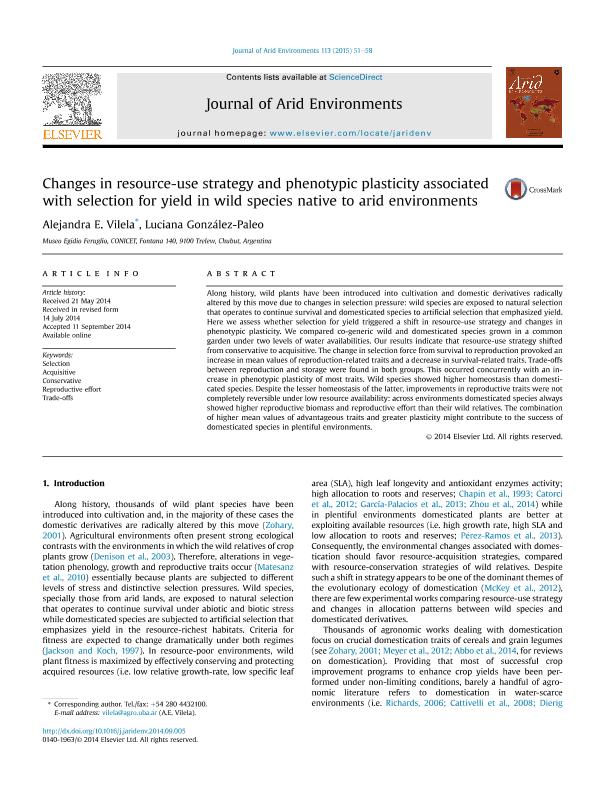Artículo
Changes in resource-use strategy and phenotypic plasticity associated with selection for yield in wild species native to arid environments
Fecha de publicación:
02/2015
Editorial:
Elsevier Science
Revista:
Journal of Arid Environments
ISSN:
0140-1963
Idioma:
Inglés
Tipo de recurso:
Artículo publicado
Clasificación temática:
Resumen
Along history, wild plants have been introduced into cultivation and domestic derivatives radically altered by this move due to changes in selection pressure: wild species are exposed to natural selection that operates to continue survival and domesticated species to artificial selection that emphasized yield. Here we assess whether selection for yield triggered a shift in resource-use strategy and changes in phenotypic plasticity. We compared co-generic wild and domesticated species grown in a common garden under two levels of water availabilities. Our results indicate that resource-use strategy shifted from conservative to acquisitive. The change in selection force from survival to reproduction provoked an increase in mean values of reproduction-related traits and a decrease in survival-related traits. Trade-offs between reproduction and storage were found in both groups. This occurred concurrently with an increase in phenotypic plasticity of most traits. Wild species showed higher homeostasis than domesticated species. Despite the lesser homeostasis of the latter, improvements in reproductive traits were not completely reversible under low resource availability: across environments domesticated species always showed higher reproductive biomass and reproductive effort than their wild relatives. The combination of higher mean values of advantageous traits and greater plasticity might contribute to the success of domesticated species in plentiful environments.
Palabras clave:
Acquisitive
,
Conservative
,
Reproductive Effort
,
Trade Offs
,
Selection
Archivos asociados
Licencia
Identificadores
Colecciones
Articulos(SEDE CENTRAL)
Articulos de SEDE CENTRAL
Articulos de SEDE CENTRAL
Citación
Vilela, Alejandra Elena; González Paleo, Luciana; Changes in resource-use strategy and phenotypic plasticity associated with selection for yield in wild species native to arid environments; Elsevier Science; Journal of Arid Environments; 113; 2-2015; 51-58
Compartir
Altmétricas




